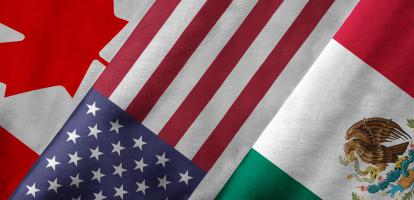From: Lawrence Herman
To: Trade observers
Date: December 18, 2024
Re: Canada’s CUSMA Conundrum
Donald Trump’s tariff threats and outrageous insults puts paid to the notion that Canada and the US have some kind of “special relationship.”
He’s resoundingly destroyed the idea, as described by President John Kennedy many years ago when addressing the Canadian Parliament, of an historic legacy shared by the two countries. Forget it.
Together with shattering the political relationship, Trump’s tariffs would contravene US obligations under both Canada-US-Mexico Agreement (CUSMA) and World Trade Organization rules. It’s a signal to the world that there are no rules for the US in its trade and commercial relations generally.
And it undercuts the musings that Canada and the US can best solve their trade and other problems bilaterally, cutting Mexico out of the picture, harkening back to the halcyon days of the 1965 Auto Pact and the 1987 Free Trade Agreement (FTA).
This is not going to happen. For one thing, resurrecting any Canada-US trade deal would mean terminating the (CUSMA) and forging a completely new Canada-US trade agreement. That would require the president to get Congress to approve new trade promotion authority (TPA) which is simply not in the cards.
Where does this leave us? Surveying the trade picture, even with Trump’s Damoclean tariff threats, there are some scenarios to consider, not all unrelievedly bleak.
Take the CUSMA, which comes up for its joint three-country review in 2026. Uncertainties abound as to how this process will unfold, given Trump’s disregard for CUSMA obligations and his disdain for trade commitments generally. US negotiators will demand many changes to the agreement – all to its advantage – as the price for its continuation.
Even with the uncertainties, there is still the possibility, remote as it may seem, that the three governments could find common ground on modernizing and updating the deal, efforts that could lead to its agreed continuation at least up to its 2036 termination date, possibly beyond.
Several ideas have been put forward in this regard, one from an Alberta coalition and another from the Expert Group on Canada-US Relations under Carleton University’s umbrella. Tough days ahead, unquestionably, but given the extent of economic integration, continuing the three-way North American deal is still achievable.
On the strictly Canada-US bilateral front, one non-CUSMA area that should continue in parallel as a win-win – without trying to do an end-run around Mexico – would be to pursue the Joint Action Plan on Critical Minerals that was agreed to between Messrs Trudeau and Trump in June 2019 during Trump’s first administration. The action plan is bilateral, outside the three-way CUSMA arrangements, compatible with the national security and re-shoring MAGA objectives of the Trump administration.
Beyond critical minerals, there are other bilateral arrangements that don’t detract from the three-way CUSMA deal. Included are enhanced border procedures and clearances, defence production sharing arrangements, cooperation in the energy field (electricity trade being much in the news) and so on. These are two-way arrangements – beneficial to the Americans – that a trade war would put at serious risk.
To help carry this forward, as was done back when Canada and the US were negotiating their first trade deal in the mid-1980s, the Canadian government should appoint a special envoy, with unimpeachable political credentials, negotiating skills and expertise, with a mandate to handle both the Trump tariff threat and the impending CUSMA review.
Looking at the challenges, here’s a short menu on how Canada should approach the difficult months ahead:
- Canada should work with the Trump team, as the government has been doing, to address US border security and drug trafficking concerns;
- At the same time, the government should continue to strongly support CUSMA, preparing proposals for modernizing and improving the agreement as part of the 2026 review process;
- Without abandoning or undercutting Mexico or CUSMA, Canada should continue to work bilaterally with the US on areas outside the agreement, particularly the Joint Action Plan on Critical Minerals and recent initiatives involving energy supply chains.
- At the same time, the government should make it clear that Canada will retaliate with effective countermeasures to any US tariffs and that cooperation in the above matters will come to an end.
- After consultation with opposition parties, the government should name a special envoy with the necessary political credentials, skills and gravitas to negotiate with the Trump administration on these matters.
It remains unclear whether a determined response by Canada, with the prospect of a full-scale economic war and all its negative consequences on both sides of the border, will lead to common sense prevailing in the White House. That said, it is incumbent on the Canadian government to present a clear and resolute position in dealing with this unprecedented threat from a former friend and ally.
Lawrence Herman, a former Canadian diplomat, is counsel at Herman & Associates and senior fellow of the C.D. Howe Institute in Toronto.
To send a comment or leave feedback, click here.
The views expressed here are those of the author. The C.D. Howe Institute does not take corporate positions on policy matters.
This Memo is abstracted from a Canadian Global Affairs Institute publication.





